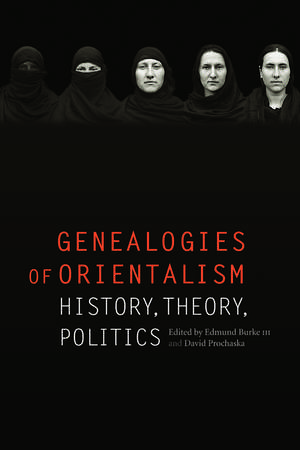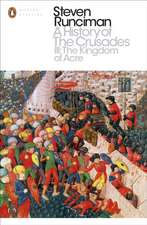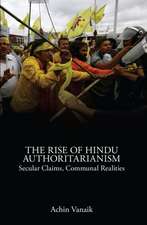Genealogies of Orientalism: History, Theory, Politics
Editat de Prof. Edmund Burke III, David Prochaskaen Limba Engleză Paperback – 30 iun 2008
Orientalism, as explored by Edward Said in 1978, was a far more complex phenomenon than many suspected, being homogenous along the lines of neither culture nor time. Instead, it is deeply embedded in the collective reimaginings that were—and are—nationalism. The dozen essays in Genealogies of Orientalism argue that the critique of orientalism, far from being exhausted, must develop further. To do so, however, a historical turn must be made, and the ways in which modernity itself is theorized and historicized must be rethought.
According to Joan W. Scott, author of The Politics of the Veil, the essays in this collection “develop a remarkable perspective on Edward Said’s Orientalism, placing it in a long historical context of critiques of colonial representations, and deepening our understanding of the very meaning of modernity.” Looking beyond the usual geography of colonial theory, this work broadens the focus from the Middle East and India to other Asian societies. By exploring orientalism in literary and artistic representations of colonial subjects, the authors illuminate the multifaceted ways in which modern cultures have drawn on orientalist images and indigenous self-representations. It is in this complex, cross-cultural collision that the overlapping of orientalism and nationalism can be found.
Preț: 224.86 lei
Nou
Puncte Express: 337
Preț estimativ în valută:
43.04€ • 46.77$ • 36.18£
43.04€ • 46.77$ • 36.18£
Carte tipărită la comandă
Livrare economică 21 aprilie-05 mai
Preluare comenzi: 021 569.72.76
Specificații
ISBN-13: 9780803213425
ISBN-10: 0803213425
Pagini: 460
Ilustrații: 33 illustrations
Dimensiuni: 152 x 229 x 29 mm
Greutate: 0.61 kg
Editura: Nebraska Paperback
Colecția University of Nebraska Press
Locul publicării:United States
ISBN-10: 0803213425
Pagini: 460
Ilustrații: 33 illustrations
Dimensiuni: 152 x 229 x 29 mm
Greutate: 0.61 kg
Editura: Nebraska Paperback
Colecția University of Nebraska Press
Locul publicării:United States
Notă biografică
Edmund Burke III is a professor of history and the director of the Center for World History at the University of California, Santa Cruz. He is the editor (with David N. Yaghoubian) of Struggle and Survival in the Modern Middle East, second edition.
David Prochaska is an associate professor of history at the University of Illinois at Urbana-Champaign. He is the author of Making Algeria French: Colonialism in Bône, 1870–1920.
Contributors include: Edmund Burke III, Zeynep Çelik, Alan Christy, Bernard S. Cohn, Fanny Colonna, Nicholas Dirks, Arif Dirlik, Leila Kinney, David Ludden, David Prochaska, Jenny Sharpe, Ella Shohat, and Julia Clancy-Smith.
Cuprins
Illustrations
Preface
Introduction: Genealogies of Orientalism
Edmund Burke III and David Prochaska
Part 1. History
1. Orientalist Empiricism: Transformations of Colonial Knowledge
David Ludden
2. The Command of Language and the Language of Command
Bernard S. Cohn
3. The Sociology of Islam: The French Tradition
Edmund Burke III
4. Scientific Production and Position in the Intellectual and Political Fields: The Cases of Augustin Berque and Joseph Desparmet
Fanny Colonna
Part 2. Culture
5. The "Passionate Nomad" Reconsidered: A European Woman in l'Algérie française (Isabelle Eberhardt, 1877<EN>1904)
Julia Clancy-Smith
6. The Unspeakable Limits of Rape: Colonial Violence and Counterinsurgency
Jenny Sharpe
7. Telling Photos
David Prochaska
8. Ethnography and Exhibitionism at the Expositions Universelles
Zeynep Çelik and Leila Kinney
Part 3. Power
9. Orientalist Counterpoints and Postcolonial Politics: Caste, Community, and Culture in Tamil India
Nicholas B. Dirks
10. Taboo Memories and Diasporic Visions: Columbus, Palestine, and Arab-Jews
Ella Shohat
11. Chinese History and the Question of Orientalism
Arif Dirlik
12. Profiteering Women and Primitive Communists: Propriety and Scandal in Interwar Japanese Studies of Okinawa
Alan S. Christy
Source Acknowledgments
Contributors
Index
Preface
Introduction: Genealogies of Orientalism
Edmund Burke III and David Prochaska
Part 1. History
1. Orientalist Empiricism: Transformations of Colonial Knowledge
David Ludden
2. The Command of Language and the Language of Command
Bernard S. Cohn
3. The Sociology of Islam: The French Tradition
Edmund Burke III
4. Scientific Production and Position in the Intellectual and Political Fields: The Cases of Augustin Berque and Joseph Desparmet
Fanny Colonna
Part 2. Culture
5. The "Passionate Nomad" Reconsidered: A European Woman in l'Algérie française (Isabelle Eberhardt, 1877<EN>1904)
Julia Clancy-Smith
6. The Unspeakable Limits of Rape: Colonial Violence and Counterinsurgency
Jenny Sharpe
7. Telling Photos
David Prochaska
8. Ethnography and Exhibitionism at the Expositions Universelles
Zeynep Çelik and Leila Kinney
Part 3. Power
9. Orientalist Counterpoints and Postcolonial Politics: Caste, Community, and Culture in Tamil India
Nicholas B. Dirks
10. Taboo Memories and Diasporic Visions: Columbus, Palestine, and Arab-Jews
Ella Shohat
11. Chinese History and the Question of Orientalism
Arif Dirlik
12. Profiteering Women and Primitive Communists: Propriety and Scandal in Interwar Japanese Studies of Okinawa
Alan S. Christy
Source Acknowledgments
Contributors
Index
Recenzii
“This collection offers a heretofore unavailable genealogy of the global through the prism of orientalism. The result is both a primer for students, and a provocation to History—as a discipline and as an instrument of imperial power.”—Antoinette Burton, author of Burdens of History and Dwelling in the Archive
“A terrific group of essays. And the introduction is magisterial.”—James Clifford, author The Predicament of Culture and Routes
“This book responds critically to the influence of Said's Orientalism, assessing its achievements and limitations. It makes a valuable contribution to the debate on orientalism.”—Talal Asad, author of Genealogies of Religion and Formations of the Secular
“These essays develop a remarkable perspective on Edward Said’s Orientalism, placing it in a long historical context of critiques of colonial representations, and deepening our understanding of the very meaning of modernity.”—Joan W. Scott, author of The Politics of the Veil
"Genealogies of Orientalism remains an interesting and extremely valuable addition to the growing oeuvre of collections devoted to orientalism and its critical interrogation."—Michael S. Dodson, Journal of World History












